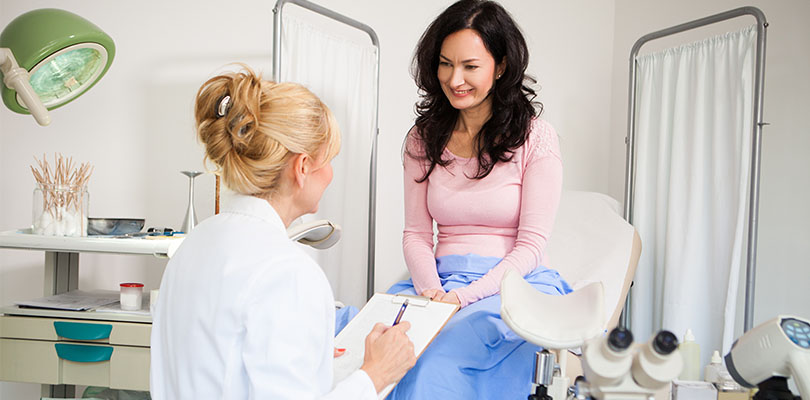What Does a Pap Smear Test for?
A Pap smear, also called a Pap test, is a screening test for cervical cancer. It tests for the presence of precancerous or cancerous cells on the cervix.
Cervical cancer is a type of cancer that occurs in the cells of the cervix — the lower part of the uterus that connects to the vagina. Various strains of the human papillomavirus (HPV), a sexually transmitted infection, play a role in causing most cervical cancer.
When exposed to HPV, a woman's immune system typically prevents the virus from doing harm. In a small group of women, however, the virus survives for years, contributing to the process that causes some cells on the surface of the cervix to become cancer cells.
Symptoms of Cervical Cancer
Early-stage cervical cancer generally produces no signs or symptoms. That’s why doctors advise women to get a Pap smear every year, to ensure diagnosis in the early stage – when the disease is most treatable.
Signs and symptoms of more-advanced cervical cancer include:
- Vaginal bleeding after intercourse, between periods or after menopause.
- Watery, bloody vaginal discharge that may be heavy and have a foul odor.
- Pelvic pain or pain during intercourse.
If you have signs of cervical cancer, make an appointment with your doctor right away.
Pap Smear Tests for Cervical Cancer
You can reduce your risk of developing cervical cancer by having screening tests and receiving a vaccine that protects against HPV infection.
The primary purpose of screening with the Pap test is to detect abnormal cells that may develop into cancer if left untreated. The Pap test can detect noncancerous conditions, such as infections and inflammation. It can also find cancer cells.
You may have the Pap test combined with HPV screening. You should still get regular Pap smears even if you’re in a monogamous relationship. That’s because the HPV virus can be dormant for years, and then suddenly become active.
Who Should Have a Pap Smear?
Not all cervical cancers are from viral infections. For this reason, it is recommended that all women begin getting regular Pap smears at age 21.
You may need more frequent tests if you have:
- Tested positive for HIV
- A weakened immune system from chemotherapy or an organ transplant
You just want a connection with another person, but you need to answer the question “Why am I single?” before you can be a couple.
If you’re over 30 and have had three normal Pap tests in a row, ask your doctor about having your Pap tests every five years.
Women over the age of 65 with a history of normal Pap test results may be able to stop having Pap smears.
Women who have had a hysterectomy (surgery to remove the uterus and cervix) do not need to have Pap tests unless the hysterectomy was done to treat a precancerous cervical lesion or cervical cancer.
What Happens When You Get a Pap Smear?
The test takes place in your doctor’s office with a nurse present and takes just 10 or 20 minutes.
During the procedure, cells from your cervix are gently scraped away and then examined for abnormal growth. You might feel a little discomfort during a Pap test, but the test itself doesn’t hurt.
Understanding the Results of Your Pap Smear
Your doctor will get them within a few days. They’ll come back either negative or positive.
- A negative result is a good thing. It means your doctor didn’t find any abnormal cells on your cervix. You won’t need another Pap test until you’re due for your next scheduled one.
- If your results come back positive, it doesn’t mean you have cancer. You might have slight inflammation. Or, you might have minor cell changes (called “dysplasia”). These often clear up on their own, so your doctor may wait to see how your next Pap test looks.
Most often, the abnormal test result means there have been cell changes caused by the HPV virus. These changes can be linked to cervical cancer. The changes can be mild, moderate, or severe.
In most cases, your doctor will suggest another Pap test in a few months. If you still have abnormal cells, your doctor may order more tests. You may need a procedure called a colposcopy so that the doctor can take a biopsy.
During a colposcopy exam, your doctor will use light and magnification to see vaginal and cervical tissues more clearly. In some cases, your doctor may also take a sample of your cervical tissue in a procedure called a biopsy.
Pap tests are very accurate, and regular Pap screenings reduce cervical cancer rates and mortality by 80 percent. It can be uncomfortable, but the brief discomfort can help protect your health.
Concerned? Talk to Your Doctor
If you any questions at any step, be sure to talk with your doctor.
While a Pap test is a routine procedure, it can cause anxiety – especially if a family member or friend has been treated for cervical cancer. Your doctor can explain each test (and results) so you feel informed and confident about your health care.







